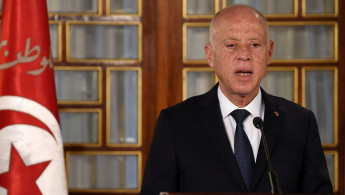Fears in Tunisia over mass bank withdrawals after president's 'coup'
Tunisians fear a "Lebanon-style" financial crisis after the emergency political actions taken by President Kais Saied on Sunday, which have been described by some as a "coup".
Saied suspended the parliament and dismissed Prime Minister Hichem Mechichi on Sunday, a move that was deemed to overstep his presidential mandate.
Although there are positive financial signals there are also fears of possible mass bank withdrawals, similar to what happened in Lebanon before banks set tight limits on accounts, The New Arab's Arabic-language sister service, Al-Araby Al-Jadeed, reported.
The president's power grab on Sunday provoked financial worry after Tunisian dollar bonds dropped - some of them in their worst position for over 14 months - Reuters reported on Monday, based on Tradeweb figures.
Informants in the banking sector calmed tensions saying that the central bank would be able to afford imports from abroad with the foreign exchange balance it holds, Al-Araby Al-Jadeed said.
But The Arab Institute of Heads of Companies said action must be taken to prevent concern about the national economic situation.
It explained this could be detected through more bank withdrawals of significant quantities of cash, hits to the stock exchange, and increased demand for consumables.
Access to raw materials is another area of concern for Tunisia with the institute warning it might be difficult to obtain the commodities.
It said that these signs need to be acknowledged and concerns addressed before they progress, arguing that the central bank is vital in this process.
Despite this, a banking sector insider noted that there was no suggestion of mass withdrawals yet and that economic activity was moving smoothly.
But the treasury is still in a healthy state, he added.
Figures revealed the equivalent of over $7.3 billion cash in its local dinar currency, equal to 130 days' worth, with the central bank.
Opinion: Tunisia's 'populist' coup two years in the making - Ernest Khoury writes for @alaraby_ar https://t.co/klwWAv1Y2m
— The New Arab (@The_NewArab) July 29, 2021
At the same time, the central bank saw a rise of 11 percent in remittances from abroad during a three-day window, as well as a 15 percent boost to tourism.
Khaled Al-Nouri, an economic expert, told Al-Araby Al-Jadeed that this rise is due to Tunisians living overseas worrying about their relatives and the money they might need.
He also suggested the improved takings in tourism were perhaps due to Tunisian nationals in other countries coming, with cash, to see how their families are doing, since expatriate Tunisians were behind the growth.
Nevertheless, Al-Nouri said it was vital that authorities monitor the situation.
A number of Arab states have experienced financial difficulties in recent years.
Lebanon has experienced economic collapse and, from October 2019, the Lebanese pound has tumbled by over 90 percent of its black-market worth versus the dollar.





 Follow the Middle East's top stories in English at The New Arab on Google News
Follow the Middle East's top stories in English at The New Arab on Google News


